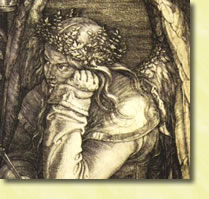 An indication that a particular interpretation of Scripture is being driven by an a priori hermeneutic can often be detected by frequency of vocabulary that appears outside of explicit exegetical discussion. There are three crucial words that appear frequently in the vocabulary of complementarian writers (those opposed to women’s ordination on the grounds of a permanent hierarchy of men over women): “authority,” “headship,” “roles.”
An indication that a particular interpretation of Scripture is being driven by an a priori hermeneutic can often be detected by frequency of vocabulary that appears outside of explicit exegetical discussion. There are three crucial words that appear frequently in the vocabulary of complementarian writers (those opposed to women’s ordination on the grounds of a permanent hierarchy of men over women): “authority,” “headship,” “roles.”
It’s All About Being in Charge
The authors of the Anglican Diocese of the Living Word’s Response to the essay Women in Holy Orders, written by Bishop Grant LeMarquand and myself, embrace a complementarian hermeneutic. Accordingly, these three words – “authority,” “headship,” “roles” – make frequent appearances in the Response. The notion of “authority” is perhaps the most important theme in the Responders’essay – so important that by my count, the authors use the word sixty times in a document of 79 pages, excluding those times in which they are quoting other authors – almost once per page!
A key notion in the complementarian position against women’s ordination is that of “headship.” In modern English, the Hebrew Bible/Old Testament, and in Latin, “head” used as a metaphor commonly means to “exercise authority over,” that is, to be a “boss,” someone “in charge.” Complementarians understand the apostle Paul’s use of the metaphor of “head” to mean that in the same way that Christ (as head) has authority over the church, so husbands (as head) have authority over their wives, and men (in general) (as “head”) have authority over women (in general). This metaphor of “head” is so central to the complementarian position that opponents of women’s ordination use the word “headship” to describe their position even in discussing passages where the word kephalē does not appear in the biblical text.
The Greek word for “head” (κεφαλή, kephalē ) that is so central to the complementarian position appears as a metaphor for the relationship between men and women in only two NT passages: Ephesians 5:23 (where the word appears twice), and 1 Cor. 11:2-12, where the word is used nine times to refer to one’s literal head, but metaphorically only three times (in verse 3). While the metaphor of “head” commonly means “authority” in modern English, numerous scholars have argued that the metaphor did not function that way either in ancient Greek or in Paul’s own use in Ephesians and 1 Corinthians (to be discussed below). Significantly, the authors of the Response use the word “headship” eight times, all in sections of the document not discussing the meaning of kephalē in Ephesians 5:23 or 1 Cor. 11:3. (Is it necessary to point out that there is no word that could be translated “headship” in the Bible?)
The Greek word for “authority” (ἐξουσία, exousia) appears nowhere in the crucial discussion in Ephesians 5, and only once in 1 Cor. 11:10, where the Greek states that “a woman ought to have authority over her head.” Context and Greek grammar indicate that the authority referred to in v. 10 is the woman’s own authority, not that of a male “head” over her (again, to be discussed in a later essay). The authors of the Response insist to the contrary that the single word “authority” in 1 Cor. 11:10 must refer to the authority of a woman’s husband over her.
Finally, a crucial notion in the complementarian position against women’s ordination is that of gender “roles.” The claim is that while men and women are ontologically equal, there is nonetheless a distinction of “roles.” It is the “role” of men to be in positions of leadership and authority, and the “role” of women to be subordinate to male authority, especially in the home and the church.
Any Greek word translated “role” does not appear in either Ephesians 5 or 1 Corinthians 11. Despite the lack of any biblical terminology that could be translated as “role,” by my count (excluding those times when they are citing other writers), the authors of the Response use the word “role” in reference to positions of hierarchy 48 times. (The notion of distinct gender “roles” based on authority seems to be an invention of complementarian authors. I am not aware of any use of the terminology before George W. Knight, III’s, The Role Relationship of Men and Women: New Testament Teaching (Philipsburg, NJ: Presbyterian and Reformed Publishing Co., 1977, 1985).)
Given the disparity in usage of the vocabulary of “head,” “authority,” and “roles” between The Response and the two critical biblical passages of Ephesians 5 and 1 Corinthians 11, it is reasonable to ask whether exegesis is guiding interpretation or rather the reverse.
In what immediately follows, I will respond to the authors of the Response, who, in their criticisms of Women in Holy Orders, claim that Paul’s use of kephale certainly does mean “authority over” and that Grant LeMarquand and myself were simply mistaken to claim otherwise in our essay Women in Holy Orders. In addition, I will also address a single criticism concerning Paul’s source for the kephalē metaphor raised by the writer Matthew Colvin in a Review Essay of my book Icons of Christ. I will use this essay to go beyond what I had written in my book.


